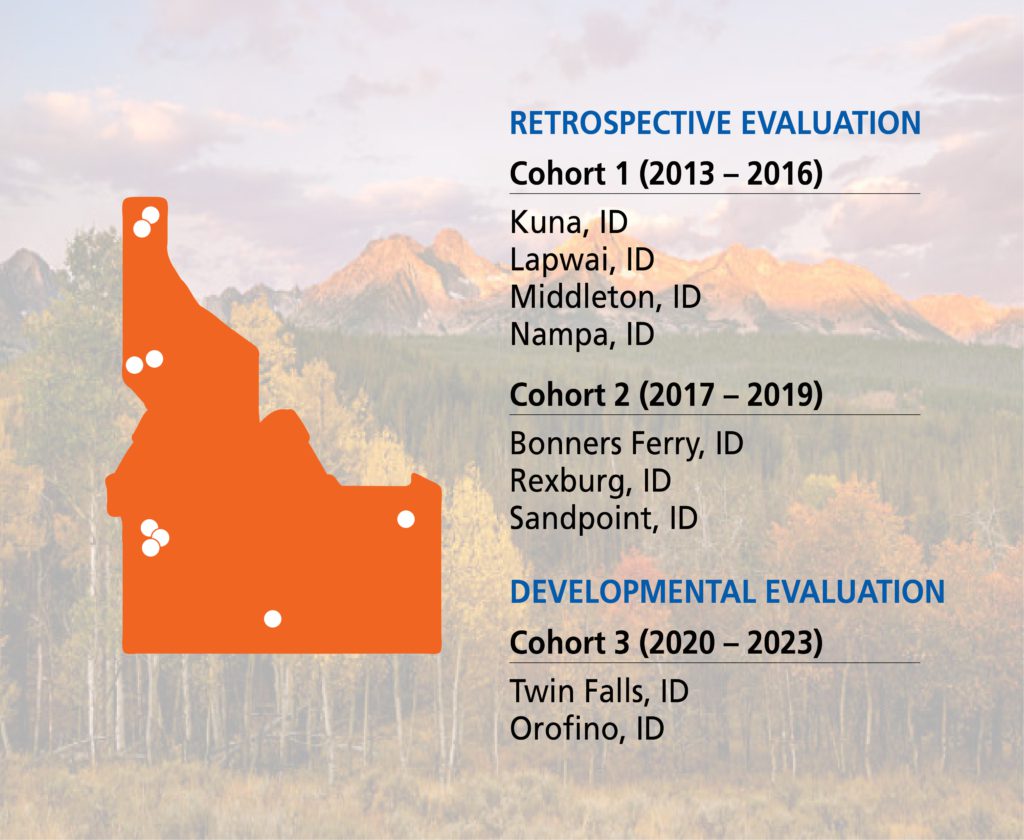
A decade ago, the Blue Cross of Idaho Foundation for Health (BCIFH) launched the first cohort of its Community Transformation Grant, a three-year program empowering communities to improve their own health and well-being.
BCIFH wanted to catalyze collaboration and innovation between local leaders who best understand the problems faced in their communities, rather than taking a more typical grantmaking approach of funding specific projects proposed by organizations through grant applications. The Community Transformation Grant (CTG) brings together leaders from community groups, health care organizations, local government, schools, and businesses to identify how to distribute an allocated sum of grant dollars within their community to improve the health of their community.
The grant program was initially designed by BCIFH as part of efforts to address childhood obesity but has evolved to address health equity more broadly. In the first year of the grant, community leaders learn about their community by conducting an assessment of local needs, opportunities, and resources. In the second year, teams of community leaders develop an action plan for the grant and in the final year, they focus on bringing the plan to life.
Since 2013, BCIFH has partnered with nine communities in Idaho to pilot and refine this collaborative approach to grantmaking. After piloting two cohorts of this three-year grant program, BCIFH knew that it wanted to take a step and evaluate its efforts in 2019. At the time, BCIFH was also beginning the third cohort of this grant program and was especially interested in a developmental evaluation, an evaluation approach that helps programs or organizations adapt and improve in real-time.
BCIFH partnered with FSG due to our deep expertise in developmental evaluation and cross-sectoral collaboration through our work on collective impact. The FSG team worked with BCIFH staff and grantee cohort members to perform a retrospective evaluation of the first two cohorts of the Community Transformation Grant and conduct a developmental evaluation for the third cohort.
The Process

First, the FSG team conducted a retrospective evaluation to understand impact and learnings from the seven communities in Cohorts 1 and 2 of the Community Transformation Grant. Our team took a mixed methods approach, which included surveys with cohort members that examined progress toward outcomes identified in the program’s theory of change and interviews with cohort members used to further understand factors that supported or inhibited change.
The retrospective evaluation for Cohorts 1 and 2 found that the impact of the CTG program extended beyond the impact of the projects it funded. By bringing community members together to address a shared community health concern, the program increased communities’ capacity for collaboration. Cohort members developed deeper relationships with one another, new voices were brought into the conversation about childhood obesity, and more people in the community came to see childhood health as something that a community could work to address. These less tangible changes likely supported the more visible changes in communities, including policy and practice change, as well as an increase in funding for healthy eating and physical activity.
At the same time, BCIFH quickly learned that this type of grant program required a more hands-on approach, as it was not just about distributing funds, but accompanying community leaders in learning and developing strong partnerships. Furthermore, every city had its own unique challenges and opportunities. When BCIFH first began working with four communities in Cohort 1, it soon became clear that this was too many communities to work with effectively. In future cohorts, the foundation focused on fewer communities and hired an additional full-time staff member to support the grant program.
For the developmental evaluation, the FSG team utilized three main types of activities to embed learning throughout the three-year community transformation grant for Cohort 3:
 1. Deep Dive: Every seven months, the FSG team would conduct a “Deep Dive,” a three-month period of data collection and analysis with each of the communities. Each Deep Dive would conclude with a Data and Learning Summit: a half-day workshop for foundation staff, board members, and Cohort 3 community members in which initial findings would be reviewed and revised. The FSG team produced an interim report at the end of the first two Deep Dives and a final report at the end of the third and final Deep Dive.
1. Deep Dive: Every seven months, the FSG team would conduct a “Deep Dive,” a three-month period of data collection and analysis with each of the communities. Each Deep Dive would conclude with a Data and Learning Summit: a half-day workshop for foundation staff, board members, and Cohort 3 community members in which initial findings would be reviewed and revised. The FSG team produced an interim report at the end of the first two Deep Dives and a final report at the end of the third and final Deep Dive.
 2. Learning Tune-Up: In between Deep Dives, the FSG team worked with foundation staff and Cohort 3 community leaders in the design and facilitation of a Learning Tune-Up during the communities’ existing steering committee meetings. For each Learning Tune-Up, the FSG team summarized key takeaways in a brief learning memo.
2. Learning Tune-Up: In between Deep Dives, the FSG team worked with foundation staff and Cohort 3 community leaders in the design and facilitation of a Learning Tune-Up during the communities’ existing steering committee meetings. For each Learning Tune-Up, the FSG team summarized key takeaways in a brief learning memo.
 3. Monthly Coaching/Planning Calls: During months where there wasn’t a Deep Dive or a Learning Tune-Up, the FSG team was available for monthly coaching calls with a working group to discuss needs and provide suggestions for the cohort.
3. Monthly Coaching/Planning Calls: During months where there wasn’t a Deep Dive or a Learning Tune-Up, the FSG team was available for monthly coaching calls with a working group to discuss needs and provide suggestions for the cohort.
Overall, our developmental evaluation surfaced numerous learnings from the work in Cohort 3 communities. Every single community leader reported that the grant increased their knowledge of local health needs and challenges, and 90% of participants said that they could better understand and address health inequities as a result of this grant. Additionally, team members were proud of what their projects achieved, were able to build new partnerships with other stakeholders, and some were able to gain additional public or private funding for their projects.
“The first phase when we learned about our community health was really enlightening. It was like a lightning bolt to me when I realized that the school is the place that determines nutrition for kids” — Cohort 3 Team Member
At the same time, BCIFH got valuable feedback on how to better structure the grant program to equip cohort team members for success, especially in Year 2 where they needed to translate their learnings into developing an action plan. Many teams said that they didn’t have the right mix of implementers and strategists, and some felt that there wasn’t adequate instruction on how to approach building and executing a work plan.
“The first year was a deep dive of education, workshops—the sticky note activity was a favorite of mine. Phase 2 of what do we do was the hard part.” — Cohort 3 Team Member
 The Impact
The Impact
Using a developmental evaluation approach has enabled BCIFH to gain quicker, real-time feedback from community leaders throughout the three-year Community Transformation Grant. This became especially important as Cohort 3 took place during the onset of a global pandemic, where community members were juggling numerous other personal, local, and national contexts. This enabled BCIFH to constantly learn, pivot, and change its approach to best serve communities.
Overall, the learnings from both the retrospective and developmental evaluations have enabled BCIFH to evolve the grant program to better serve each city. Over the last decade of the Community Transformation Grant, BCIFH has learned countless lessons about building community-driven approaches to grantmaking. Throughout this process, it has been critical for the foundation to voice their humility in not knowing the best solutions, because community members know their communities best.
“It was strange…usually it’s ‘we’re going to do this project and you give us money to do it’ vs. ‘there is this pot of money that you can use after you absorb this information on your community.’ It was a fun challenge and left an open book for me.” — Cohort 3 Team Member
Through the Community Transformation Grant, the foundation is changing the traditional funder-grantee relationship by centering the importance of solutions that are created by the community for the community. By bringing community members together to learn about and address local health needs, the program has built unique cross-sectoral relationships from leaders in local government, community organizations, and neighborhoods. By utilizing tools such as developmental evaluation, the foundation is creating pathways to best listen and respond to community needs. These approaches can serve as best practices for other foundations seeking to build trusting relationships with communities and adopting more participatory forms of grantmaking.
“We are always looking for ways to improve and learn from our grant programs and processes. FSG’s evaluation of our Community Transformation Grant cohorts provided us with valuable data, insights, and suggestions that we will use going forward. Our partnership with FSG enabled us to continually learn, pivot, and change our approach to best serve communities.” — Kendra Witt-Doyle, Executive Director, Blue Cross of Idaho Foundation for Health

About Blue Cross of Idaho Foundation for Health
The Blue Cross of Idaho Foundation for Health, Inc., is a nonprofit charitable foundation established in 2001 by Blue Cross of Idaho. The Foundation is dedicated to addressing the root causes to some of Idaho’s most pressing health issues. More information is available at www.bcidahofoundation.org.


 The Impact
The Impact 


